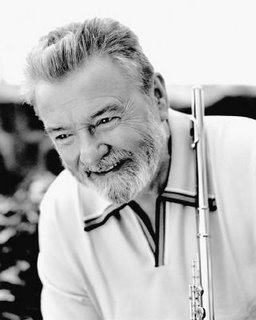 Monday's night's recital by James Galway, sponsored by Washington Performing Arts Society in the Kennedy Center Concert Hall, was an event for flutists. So, as with Galway's last appearance in Washington, with the National Symphony Orchestra in 2006, it was the rare concert that could lure favorite flutist Mrs. Ionarts out on a Monday night. Microphone in hand, Galway narrated the evening with easy charm, first asking all of the flutists in the audience to raise their hands (they were legion, young and old) and then relating anecdotes and bits of trivia. He described his program as a survey of all the pieces that just about all flutists play and struggle with, adding that the "first half is the roast beef, with the second half all desserts."
Monday's night's recital by James Galway, sponsored by Washington Performing Arts Society in the Kennedy Center Concert Hall, was an event for flutists. So, as with Galway's last appearance in Washington, with the National Symphony Orchestra in 2006, it was the rare concert that could lure favorite flutist Mrs. Ionarts out on a Monday night. Microphone in hand, Galway narrated the evening with easy charm, first asking all of the flutists in the audience to raise their hands (they were legion, young and old) and then relating anecdotes and bits of trivia. He described his program as a survey of all the pieces that just about all flutists play and struggle with, adding that the "first half is the roast beef, with the second half all desserts."Far and away, the most beautiful sounds came in the first half, especially the opening work, the Poulenc flute sonata. In his remarks, Galway picked up on the fact that Poulenc was living in the Hôtel Majestic at Cannes when he composed this piece, launching into an entertaining but dubious reconstruction of how the music might be related to life in a hotel. This overlooked the most important local connection, that Poulenc dedicated this melodic and harmonically lush sonata à la mémoire de Madame Elizabeth Sprague Coolidge, the great patroness of contemporary music and of the Library of Congress's music programs. Galway lent his still lovely tone, soft and sultry, effortlessly floating, and discouraged the tentative applause after the first movement with a funny grimace. The third movement was a playful romp, in which those 68-year-old hands displayed remarkable fluidity.
Although it seems in some way counterintuitive, the opening of the Prokofiev flute sonata in D major, op. 94, has a harmonic palette in common with the Poulenc and thus provided an ideal segue. In the first movement, the riffs up to high A in the pedal point before the recapitulation meshed perfectly with the similar piano licks, and Galway's rendition of the last, ultra-high statement of the main theme was a breath-takingly pure, silvery sliver. The second movement, more in the grotesquerie style of Prokofiev, was taken perhaps too fast for Allegretto, although the breezy, jazz-nuanced trio struck a charming contrast. In the third movement, as in parts of the Poulenc, Galway used his broad, slightly woody low range to sultry effect. The unfortunate truth about this sonata, however, is that its fourth movement is kind of a dud. Galway may have done better to end the first half with the Poulenc instead.
Stephen Brookes, Toot Sweet: At the Kennedy Center, Flutist James Galway's Easy-Listening Virtuosity (Washington Post, February 27) Deb Lamberton, MP3: Classical Conversation with James Galway (WETA-FM) |
Although Jeanne Galway, the flutist's second wife, headed up the concert billing with her husband, she was trotted out for only one piece, a rather run-of-the-mill Rigoletto Fantasy for two flutes by Franz and Karl Doppler. All of your favorite tunes are there, Bella figlia dell'amore, La donna è mobile, Caro nome. Three encores satisfied the Galway fans, beginning with an arrangement of Mozart's Rondo alla Turca for two flutes, which brought back Lady Galway. No one would be happy if the Golden Flute did not play Danny Boy, as he did without piano as his NSO encore in 2006, a piece Galway described as "like a prayer." Indeed, no Oirish oye was left dry in the house. Henry Mancini's Speedy Gonzalez was the final nightcap, sending off the flutist and her husband to relieve the babysitter.
The next recital sponsored by WPAS will feature violinist Joshua Bell and pianist Jeremy Denk (March 3, 8 pm), in the Kennedy Center Concert Hall.
No comments:
Post a Comment